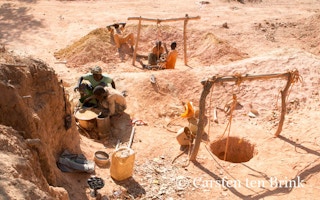Criminal gangs are plundering the Earth’s natural resources faster than previously thought, with the value of environmental crimes estimated to be as high as $258 billion annually, U.N. and police officials said on Saturday.
The value of stolen natural resources - including fish, timber, gold and other minerals - has risen by 26 per cent in the last year, according to a report from the United Nations Environment Programme (UNEP) and Interpol, the largest international police organisation.
“Environmental crime is growing at an alarming pace,” Interpol Secretary General Jurgen Stock warned in a statement.
The world’s fourth most valuable criminal enterprise after drug smuggling, counterfeiting and human trafficking, environmental wrongdoing undermines local land rights, threatens sustainable development and finances conflicts, U.N. officials said.
Weak laws and poorly funded security forces are enabling international criminal networks and armed rebels to profit from a trade that also damages ecosystems and threatens species with extinction, the report said.
“
The vast sums of money generated from these crimes keep sophisticated international criminal gangs in business and fuel insecurity around the world.
Achim Steinern, executive director, UNEP
Today, environmental crimes are worth between $91 billion and $258 billion, up from between $70 billion and $213 billion in 2014, UNEP and Interpol said.
The illegal small arms trade, in contrast, is worth around $3 billion annually.
“The vast sums of money generated from these crimes keep sophisticated international criminal gangs in business and fuel insecurity around the world,” UNEP Executive Director Achim Steiner said in a statement.
“The result is not only devastating to the environment and local economies, but to all those who are menaced by these criminal enterprises.”
For example, criminal networks linked to the conflict in eastern Democratic Republic of Congo have spent about 2 per cent of their proceeds to fund up to 49 different rebel groups. And illegal gold mining in Colombia is now considered one of the easiest ways to launder money from the country’s drug trade, the report said.
In the last decade, environmental crime - including the illegal sale of minerals, trafficking in hazardous waste, carbon credit fraud and illegal fishing - has grown by at least 5 to 7 percent per year, more than twice as fast as the broader global economy, it added.
Police and U.N. officials are urging countries to offer economic incentives and alternative work opportunities to low-level environmental criminals, while disrupting the tax havens wealthy crooks use to launder their loot.
They also want countries to take the problem more seriously by committing resources to tackle it.
The amount of money lost due to environmental crime globally is 10,000 times greater than the amount of money spent by international agencies fighting it, the report said.
This story was pubished with permission from the Thomson Reuters Foundation, the charitable arm of Thomson Reuters, that covers humanitarian news, women’s rights, trafficking and climate change. Visit news.trust.org

















